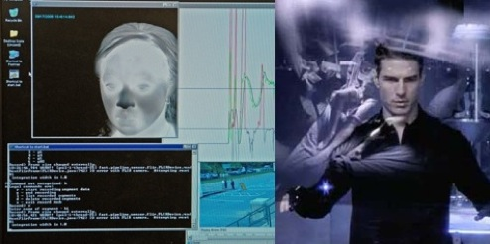
The Department of Homeland Security's been researching a sensor system that tries to predict "hostile thoughts" in people remotely for a while, but it's just spoken up about developments and renamed the system "Future Attribute Screening Technologies," FAST, which sounds really non-intimidating. It was called "Project Hostile Intent." But check out the technology's supposed powers for a re-think on how intimidating it sounds: it remotely checks people's pulse rate, breathing patterns, skin temperature and momentary facial expressions to see if they're up to no good. The system uses a battery of sensors—everything from simple cameras to infrared sensors to eye-safe laser radars—to do its job, and it then collates the data to determine if people are displaying biological markers that betray mal-intent. In recent tests, in which volunteers were asked to sometimes deliberately act suspiciously, the system even apparently had a 78% success rate, which sounds amazing. But, as fans of Minority Report will note, it sounds like FAST is crossing into new moral "pre-crime" terrain. And all that data could detect that you have an illness that you didn't know about, or want publicized...detection by the DHS could be seen to constitute an invasion of privacy. The DHS says that's not a problem, since the data is never linked to an identity and is only used to help officers decide if a suspicious person should be interviewed. Though it's not known if the spokesman was standing before the FAST sensors when he made that statement. The research has a long way to go, and has yet to face its real challenge: how well it impacts public safety without compromising people's time or privacy, when thousands are streaming past a FAST sensor array. Those are big hurdles to get over, before you start seeing FAST booths at airports or big public events. [NewScientist and DailyTech]
[ Via: Gizmodo, The Gadget Blog ]
[ Tag: ]
0 коммент.:
Отправить комментарий